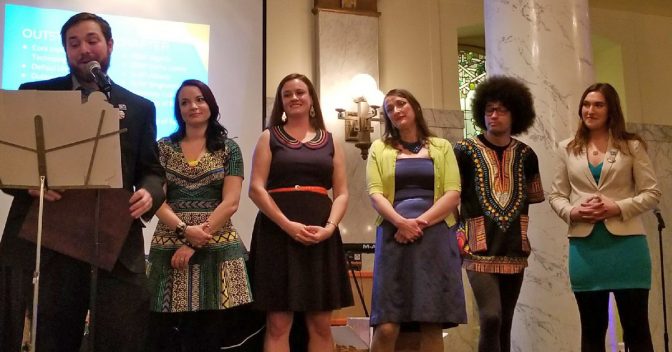SSDP 2018: Student Activists Confer in Baltimore


From left to right: Tyler Williams, Dr. Vilmarie Narloch, Stacia Cosner, Betty Aldworth, Scott Cecil and Elise Szabo. (Photo by Jacob Plowden)
In the wake of the school shooting in in Parkland, Fla., students have organized, lobbied and grilled lawmakers on national TV. A similar energy was in the air at Students for a Sensible Drug Policy’s annual conference in Baltimore from Mar. 2-5.
“There’s an uncompromising integrity to what students are looking for,” said Betty Aldworth, SSDP executive director. “They have a sense of a better future that so many of us who are no longer young are able to consider.”
The students chose the agenda for the conference by submitting ideas and voting on them. This resulted in panels on everything from harm reduction to entrepreneurship, cryptocurrency to creating equity in the legal cannabis industry. Just over half of the work of SSDPers is cannabis-related. As marijuana is the most widely used illicit substance, it’s a natural starting point for the broader movement of drug-policy reform.
Former students involved with the organization have gone on to flourish in both business and advocacy. Kris Krane, who was part of a founding SSDP chapter in 1998 and served as the executive director from 2006 to 2009, is now president of 4Front Ventures, a cannabis consulting and operations company based in Boston that holds medical marijuana licenses in four states.
“It really occurred to me as I was transitioning out of SSDP that this was a way that we could move the entire issue forward as effectively as the advocacy work that we were doing,” Krane told Freedom Leaf. “I think [businesses] have a clear moral responsibility to be involved in [advocacy]. We’re making money off an industry… while other people are going to jail for the same kind of behavior.”
While both activists and businesspeople advocate for legalizing cannabis, there can be a conflict between justice and profit as priorities. “I don’t think there’s anybody in this community who is prepared to accept the commercialization of cannabis, without having attached to it a recognition that people have been suffering under the War on Drugs for a very long time,» Aldworth commented,
During the DARE Plenary (for Diversity, Awareness, Reflection and Education) on Mar. 3, Shamah Bulangis of the Philippines discussed her country’s brutal drug war, silencing the crowd with a story about a man who’d stopped using drugs after successfully completing a treatment program and was volunteering at the same rehabilitation center when “three masked men stormed [his] house, held his wife at gunpoint and shot him in the head.”
“We have chapters everywhere from Manila to Berkeley,” Aldworth explained. “Responding to each of those students’ needs is obviously quite different. There’s no major social civic change that I’m aware of in the last several hundred years anywhere in the world that has succeeded without the engagement of a strong student or youth movement.”
Related SSDP Posts
Betty Aldworth: It’s Time for Prohibition to Retire
Women in Cannabis: Fewer Job Opportunities, But More Respect
If you enjoyed this Freedom Leaf article, subscribe to the magazine today!

